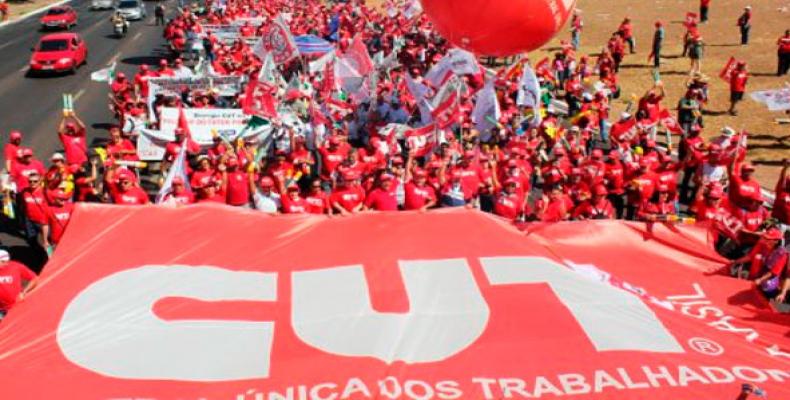Havana, May 2 (RHC)-- News stories from around the world reported on marches and protests on Wednesday, May 1st, International Workers' Day.
The tradition of May Day marches for workers’ rights began in the United States in the 1880s. Marches quickly spread to other countries at a time when industrialization pitted poorly paid employees who had few protections and little power against increasingly dominant factory employers and landowners.
This year, in Germany, higher salaries, better working conditions, maternity leave, minimum wage and an end to discrimination against temporary or foreign workers were among the issues raised during protests in Berlin and other cities. Thousands of union members and labor activists rallied in the German capital on Wednesday.
In Italy, two protesters and a police officer were injured in the Italian city of Turin when police blocked a demonstration against the construction of a high-speed rail line between France and Italy, according to ANSA, an Italian news agency.
Among the protesters were members of the 5-Star Movement, a populist party that is in Italy’s ruling coalition but is opposed to the tunnel. One member, Torino city councilor Damiano Carretto, said on Facebook that he was hit in the head and on the hand by a police truncheon.
Authorities in Russia said about 100,000 people took part in a May Day rally on Red Square in central Moscow organized by central trade union federations.
In Paris, French police clashed with stone-throwing protesters who set fires and smashed up vehicles as thousands of people gathered for May Day rallies under tight security. Reports from the AFP news agency say there were about 165 arrests made in the French capital. Police repeatedly used tear gas to try to control the crowd gathering near Paris’ Montparnasse train station for the main protest. Some protesters were reportedly injured.
Turkish police detained May Day demonstrators trying to march toward Istanbul’s main square, which has been declared off-limits by authorities, who cited security concerns. Still, small groups chanting “May Day is Taksim and it cannot be banned,” attempted to break the blockade, with dozens reportedly detained.
According to reports from Sweden, May Day protesters threw cobblestones and fireworks at police, included mounted officers, who were trying to keep them away from a neo-Nazi rally in Goteborg, Sweden’s second largest city.
In neighboring Denmark, helmeted police circled their vans around hooded people in black shouting anti-police slogans to keep them away from other May Day demonstrations in Copenhagen, the capital. Several dozen were detained by police in both countries.
In Sri Lanka, major political parties called off the traditional May Day rallies due to security concerns following the Easter bombings, which killed 253 people and were claimed by militants linked to the Islamic State group.
Wearing headbands and swinging their fists, protesters in South Korea’s capital of Seoul rallied near City Hall, marching under banners denouncing deteriorating working conditions and demanding equal treatment and pay for temporary workers. A major South Korean umbrella trade union also issued a joint statement with a North Korean workers’ organization calling for the Koreas to push ahead with joint economic projects, despite lack of progress in nuclear negotiations between Washington and Pyongyang.
Union rallies in Greece paralyzed national rail, island ferry and other transport services. Hundreds of people gathered in central Athens on Wednesday for three separate marches to parliament organized by rival unions and left-wing groups.
Spain’s workers marched in the country's major cities to make their voices heard days before acting Prime Minister Pedro Sánchez starts negotiating with other parties to form a new government. Leading labor unions are pressing Sánchez to roll back business-friendly labor and fiscal reforms that have remained in place since the conservatives were in charge.
In Bangladesh, hundreds of garment workers and members of labor organizations rallied in Dhaka, the capital, to demand better working conditions and higher wages. Nazma Akter, president of some of Bangladesh’s largest unions, said female garment workers were also demanding six months of maternity leave and protection against sexual abuse and violence in the workplace.
And to mark International Workers' Day, in the Philippines, thousands of workers and labor activists marched near the Malacanang presidential palace in Manila to demand that President Rodrigo Duterte’s government address labor issues including a minimum wage increase and the lack of contracts for many workers. One labor group said its members would not vote for any candidate endorsed by Duterte in upcoming senate elections and burned an effigy of the president.


